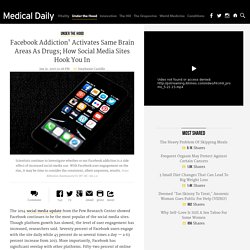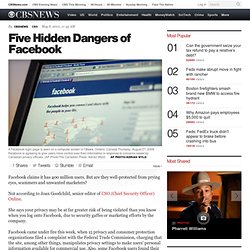

5 Crazy Ways Social Media Is Changing Your Brain Right Now. Facebook Addiction' Activates Same Brain Areas As Drugs; How Social Media Sites Hook You In. The 2014 social media update from the Pew Research Center showed Facebook continues to be the most popular of the social media sites.

Though platform growth has slowed, the level of user engagement has increased, researchers said. Seventy percent of Facebook users engage with the site daily while 45 percent do so several times a day — a 63 percent increase from 2013. More importantly, Facebook has significant overlap with other platforms. Fifty-two percent of online adults use two or more social media sites, another significant increase from 2013. But, are these increased numbers a sign of enjoyment or addiction? Scientists have been investigating the idea of Facebook addiction for years now.
It’s the element of compulsion that a new study published in the journal Psychological Reports: Disability and Trauma reinforces. Even so, Live Science reported this study was limited. Internet Addiction: A Brief Summary of Research and Practice. Using Social Media To Cover For Lack Of Original Thought - Onion Talks - Ep. 6. “Tip-of-the-Tongue Syndrome,” Transactive Memory, and How the Internet Is Making Us Smarter.
By Maria Popova “A public library keeps no intentional secrets about its mechanisms; a search engine keeps many.”

“The dangerous time when mechanical voices, radios, telephones, take the place of human intimacies, and the concept of being in touch with millions brings a greater and greater poverty in intimacy and human vision,” Anaïs Nin wrote in her diary in 1946, decades before the internet as we know it even existed. Her fear has since been echoed again and again with every incremental advance in technology, often with simplistic arguments about the attrition of attention in the age of digital distraction. But in Smarter Than You Think: How Technology is Changing Our Minds for the Better (public library), Clive Thompson — one of the finest technology writers I know, with regular bylines for Wired and The New York Times — makes a powerful and rigorously thought out counterpoint.
He writes in the introduction: Page from 'Charley Harper: An Illustrated Life' Donating = Loving. Del Harvey: The strangeness of scale at Twitter. Juan Enriquez: Your online life, permanent as a tattoo.
What the Internet is Doing to Our Brains [Epipheo.TV] Rozmowy w toku, Co twoje dziecko jest w stanie zrobić za "lajka"? online. Cały dzień wpatrzone w ekran smartfona.

Nie „lubią”, a „lajkują”. Mają setki wirtualnych znajomych, z którymi wymieniają się swoimi „selfi”. Tak żyją nastolatki, czego niestety rodzice pojąć nie mogą i nie chcą… Czy dziś w programie zrozumieją, jakimi prawami rządzi się świat ich dzieci? Milena mówi, że dla niej Facebook jest jak członek rodziny, dlatego o niego dba. Natalia uważa, że ważne jest przede wszystkim to, żeby ludzie lajkowali jej zdjęcia, a Ilona, siostra która wychowuje obydwie dziewczyny od śmierci mamy, załamuje ręce. Produkcja: Kraj produkcji: Viviane Reding on privacy and safety on the Internet (30. November 2010, The European Data Protection and Privacy Conference) Quote I heard today on Social Media Thursday meeting (translated by me):
Five Hidden Dangers of Facebook. A Facebook login page is seen on a computer screen in Ottawa, Ontario, Canada Thursday, August 27, 2009.

Facebook is agreeing to give users more control over their information in response to concerns raised by Canadian privacy officials. (AP Photo/The Canadian Press, Adrian Wyld) AP Photo/Adrian Wyld Facebook claims it has 400 million users. But are they well-protected from prying eyes, scammers and unwanted marketers? Not according to Joan Goodchild, senior editor of CSO (Chief Security Officer) Online.
She says your privacy may be at far greater risk of being violated than you know when you log onto Facebook, due to security gaffes or marketing efforts by the company. Facebook came under fire this week, when 15 privacy and consumer protection organizations filed a complaint with the Federal Trade Commission, charging that the site, among other things, manipulates privacy settings to make users' personal information available for commercial use. In two words, asserts Goodchild - not very.